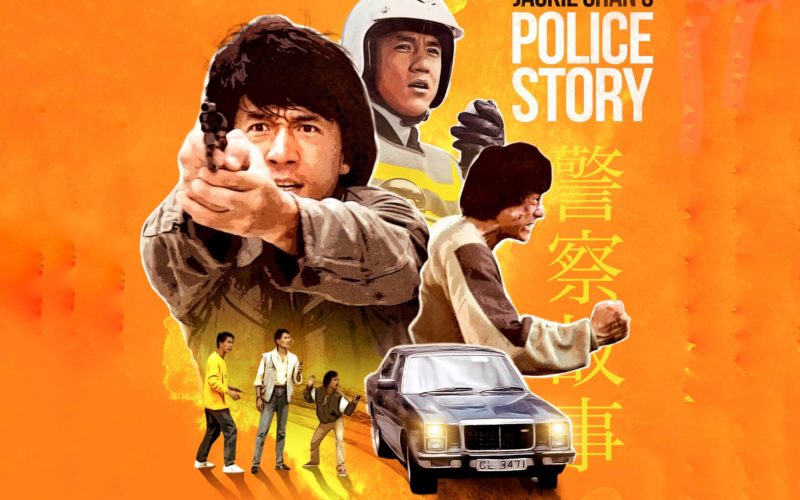Police Story (1985).
There is a certain pleasure that comes from watching a Jackie Chan movie. There are bigger and often better action films out there and there are funnier comedies, but few filmmakers/performers are able to combine the two in such a joyous way. There’s a delirious quality about them that, even when the plot is a bit thin, you can’t help but be fully engaged.
By the time of his first real successes in the action-comedy genre with Snake In The Eagle’s Shadow and Drunken Master (both 1978) and his emergence onto the international scene in the early 1980s with an appearance in The Cannonball Run, he had already been working for almost two decades. His first role came when he was only 5 years old, and he had over 30 films to his name, including uncredited turns in classics such as Fist of Fury, A Touch of Zen and Enter The Dragon.
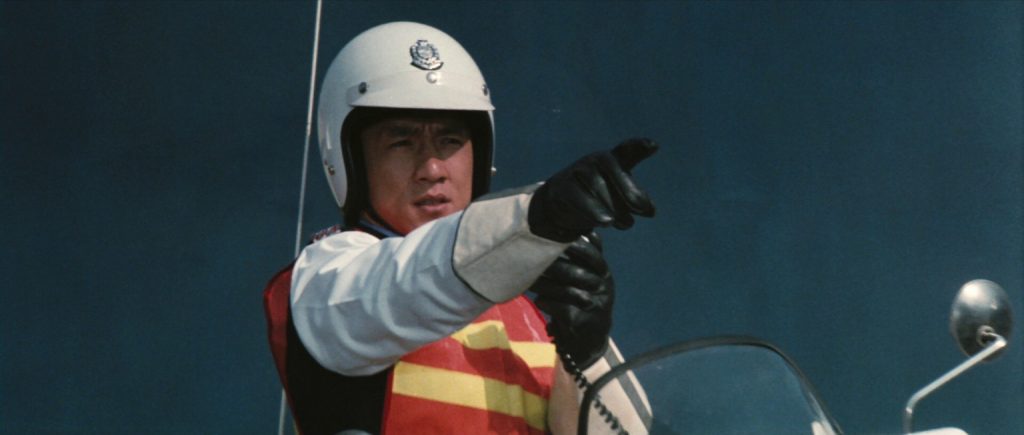
By the time his classic actioner Police Story was released in 1985, Chan was a seasoned performer with a huge domestic following and a continually growing international audience. What’s more, he had developed a recognisable persona which he carried from film to film.
Police Story is a classic not just because it remains a highly entertaining movie almost 35 years later that hasn’t really dated much at all, but also because it highlights the special talent that is Jackie Chan, a man who seemingly put his body on the line with every film he made (and continues to make).
The story is very simple; Chan plays Ka-Kui, a policeman who, in an action-packed opening scene, distinguishes himself by catching Chu Tao (Chor Yuen), the boss of an organised crime gang. Although Chu is soon released, the police come up with a plan to force his secretary, Selina (Brigitte Lin), to give evidence against her employer. They do this by creating the illusion that Selina has already given them information, forcing Chu to order her assassination and so convince Selina of her boss’ ruthlessness.
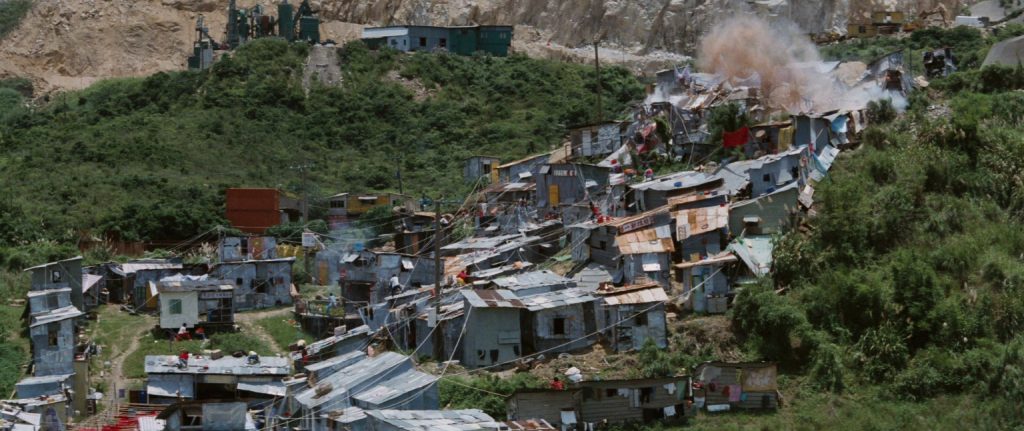
The rest of the film follows Ka-Kui as he tries to convince Selina that Chu is not the benevolent old man that she thought he was, but a ruthless crime boss. The film is constructed around a series of set pieces which normally could be a problem. Chan told screenwriter Edward to construct the narrative around certain locations and props, allowing Chan to choreograph his stunts and moments of comedy from pre-existing ideas that he had already developed.
The opening scene, in which the police surveillance of Chu goes spectacularly wrong, is more Hollywood than you would normally expect from Chan, relying not on beautifully choreographed close combat, but on an extravaganza of destruction as cars careen downhill, through a slum full of houses, shops and the like, smashing up the place in spectacular fashion. The cars crash through shacks and jump down steep inclines, wrecking everything in front of them. One shot, taken from a distance, showing the various cars racing to the bottom of the hill, is a sight to behold and will have your mouth agape in awe.
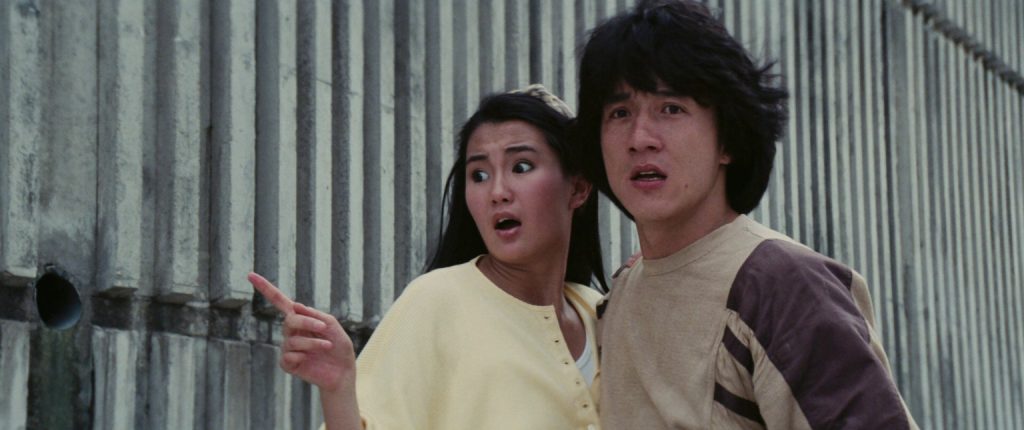
If your thinking that this is a different type of Jackie Chan film, more crime thriller than the typical martial arts showcase that he is so famous for, then be reassured, Police Story is full of most head crunching, bone breaking, rib tickling action you could want.
The first of these scenes is played for laughs as Ka-Kui fights off someone who looks like a potential assassin but is in fact a friend of our hero masquerading as a killer in order to convince Salina of the danger she’s in. But the real bad guys soon turn up and we get fights in cars and on the top of cars, Chan jumping from the roof of one into the windscreen of another, smashing the glass and knocking out a bad guy, intricate choreography that gets the heart pumping and makes us smile in appreciation of the incredible skill and daring on display.
The final scene in the shopping mall is justifiably regarded as one of the greatest set pieces in movie history. Fights take place in various aisles, using a multitude of props, henchmen are thrown down moving escalators, displays are trashed as people are flipped over and dropped upon them, glass shattering across the floor. And it’s not just Chan and the assorted bad guys who get it. Both Selina and May, Ka-Kui’s girlfriend (played by Maggie Cheung) are also propelled through the air, landing on their backs, furniture smashing beneath them.
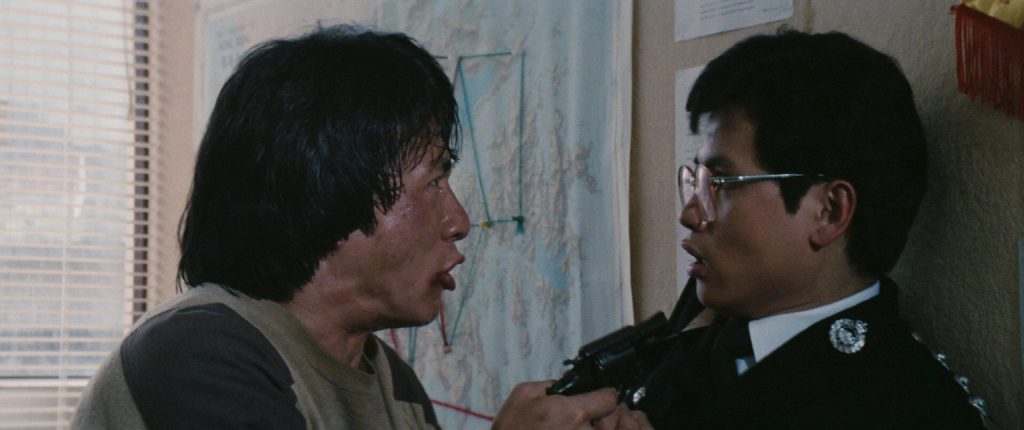
Two moments in particular stand out from all this mayhem;
The first is over is a flash yet leaves a lasting impression. Ka-Kui is shoved into a plate of glass which doesn’t shatter as glass often does in scenes like this. It cracks as Chan’s face makes brutal contact. The audience grimaces, feeling the impact. Chan certainly looks like he feels it.
The second is the finale of this scene as Ka-Kui, realising Chu is going to get away, propels himself off a balcony and onto a column on which a myriad of lights are attached. As he slides down the lights explode, flashing brilliantly as he descends. There is the sound of explosions and Chan’s grunts as he clatters through the wires. At the bottom he lets go of the pole and lands on the top of another display. The stunt is both beautiful and savage in its execution. Chan admitted later that the thought of completing it made him nervous and before he took the leap, a stunt man gave him a hug and a Buddhist prayer, which Chan put in his pocket for good luck. His only reassurance from the man charged with making sure the lights wouldn’t give him an electric shock was ‘don’t worry, we’ll watch you, if anything happens, we’ll shut off the lights’. The stunt is shown three times and it’s obvious why. Aside from the fact that it was extremely dangerous (Chan admitted his skin was peeling when he got to the bottom), it is also jaw-droppingly spectacular.
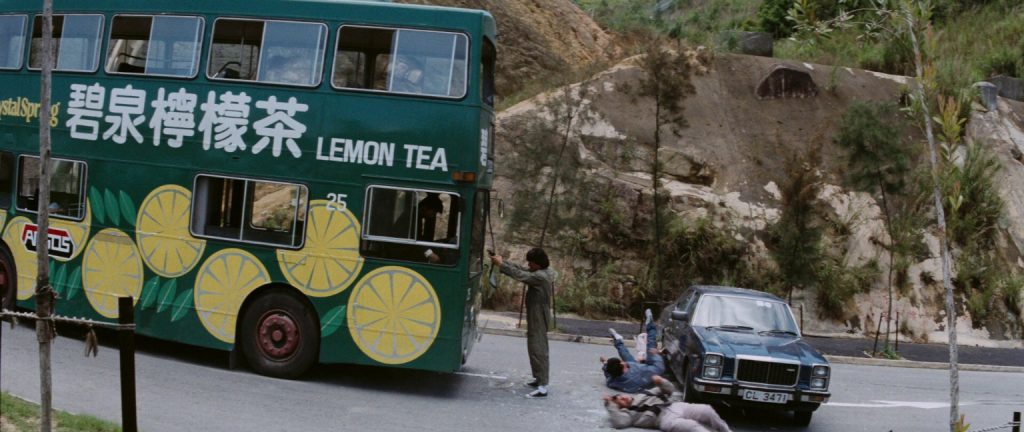
The shopping mall wasn’t a set but a working mall and the whole production had to make sure that everything was returned to the original state by morning so that the shops could open. According to Chan, he was also filming Heart of Dragon at the same time so, immediately after celebrating the success of the stunt with a beer, he was quickly back to work.
The big allure of a Jackie Chan film is that whatever he did on screen, he did in real life, it’s all done for real. In this respect he shares a pedestal with the great silent era comedian, Buster Keaton, another actor who put life and limb on the line to get that perfect shot.
Keaton famously stood still as the side of a house fell on him, avoiding certain death by inches. He reached out and grabbed a moving vehicle and was propelled from a stationary position. He jumped off a train with tonnes of water crashing on top of him. He did all these things for the sake of his art and this is what Jackie Chan does too. This is physical comedy and action taken to its extreme. In most films, stunts are performed by specialists who train for years. The most important asset for any film is the star; if anything happens to them, the whole investment is in jeopardy. This is what makes artists like Keaton and Chan all the more remarkable.
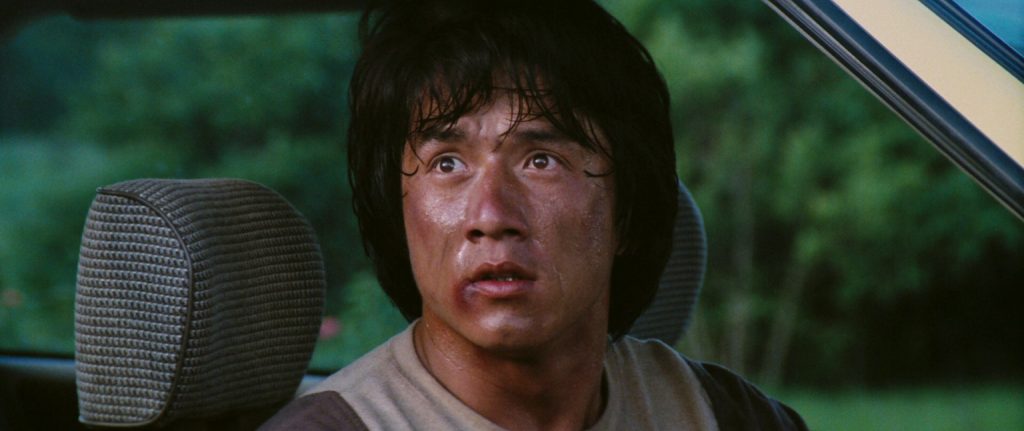
If you’re looking for depth, then Police Story is not for you. You don’t watch a Jackie Chan movie for profound insight but to be entertained, to be thrilled. You go to appreciate the work and effort that goes into making these films. This is, I believe, an important point. Most films you can enjoy without acknowledging the incredible craftsmanship that goes into making them. You suspend your disbelief and forget about the specifics of the production process, choosing instead to believe the characters wholesale. But the public persona of Jackie Chan and the characters he portrays are intricately linked in a way that we rarely see anymore. Many of his characters were remarkably similar and they rely on a bond of understanding between viewer and performer. Chan is more than an actor, he is a brand. It was the same with Keaton and Chaplin at the start of the last century and possibly Schwarzenegger and Stallone towards the end. The performer and the performances become one.
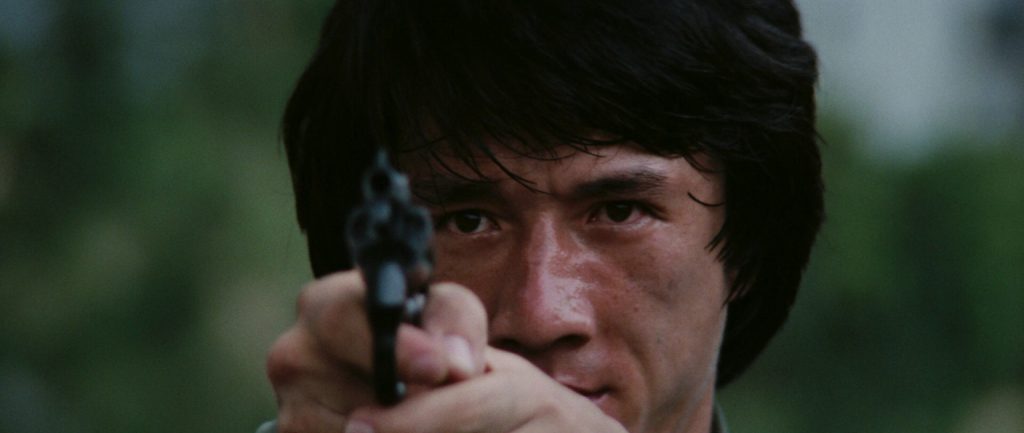
Police Story really is peak Jackie Chan. If you were to list everything that you would want from a Jackie Chan film, you would find it all here. It’s a Christmas list of movie action, delirious fun and well worth checking out.
Eureka have recently released Police Story & Police Story 2 on Blu-ray and they’ve been given the full 4K treatment and each film ends with outtakes from the production, an idea that furthers the idea of Chan as a craftsman and an artist who puts his body on the line all for the sake of our entertainment.
There are actually 6 films in the series and the first 5 episodes are constant fun with only the sixth entry, Police Story 2013, proving a little disappointing. But that’s ok, Police Story, like later episodes, is great fun and proof, if ever we needed it, of the greatness of the multi-talented artist that is Jackie Chan.
Film’89 Verdict – 9/10
Police Story and Police Story 2 are currently available on Blu-Ray in the U.K. courtesy of Eureka Entertainment and in the US courtesy of The Criterion Collection.

